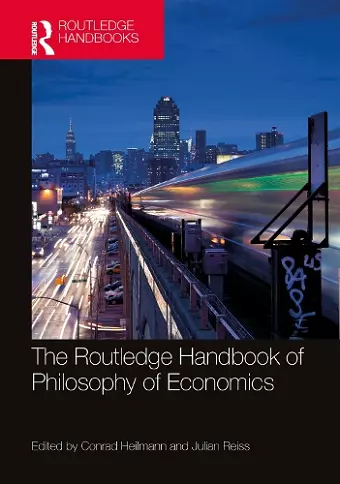The Routledge Handbook of the Philosophy of Economics
Julian Reiss author Conrad Heilmann author
Format:Paperback
Publisher:Taylor & Francis Ltd
Published:25th Sep '23
Currently unavailable, and unfortunately no date known when it will be back
This paperback is available in another edition too:
- Hardback£230.00(9781138824201)

The most fundamental questions of economics are often philosophical in nature, and philosophers have, since the very beginning of Western philosophy, asked many questions that current observers would identify as economic. The Routledge Handbook of Philosophy of Economics is an outstanding reference source for the key topics, problems, and debates at the intersection of philosophical and economic inquiry. It captures this field of countless exciting interconnections, affinities, and opportunities for cross-fertilization.
Comprising 35 chapters by a diverse team of contributors from all over the globe, the Handbook is divided into eight sections:
I. Rationality
II. Cooperation and Interaction
III. Methodology
IV. Values
V. Causality and Explanation
VI. Experimentation and Simulation
VII. Evidence
VIII. Policy
The volume is essential reading for students and researchers in economics and philosophy who are interested in exploring the interconnections between the two disciplines. It is also a valuable resource for those in related fields like political science, sociology, and the humanities.
Economics has shaped our world through the influence its ideas have had on business behaviour and government policies. As this climate of ideas is clearly changing, there could not be a better time to explore the philosophy of economics. This Handbook is an important contribution to interrogating economics and asking how the discipline could be set on firmer ethical and philosophical foundations.
Diane Coyle, University of Cambridge
This handbook is a unique reference on the philosophy of economics, with a very comprehensive coverage and an impressive slate of contributors, many of them belonging to a generation of emerging scholars in the field. It nicely integrates questions of rationality, ethics, and methodology, and it firmly establishes the intimate connection between philosophy and economics, two disciplines which share many traits and interests. A most useful resource for researchers and students interested in the field.
Marc Fleurbaey, Paris School of Economics
Handbooks manifest progress and growth of a research field. Since the Oxford Handbook of the Philosophy of Economics (2009) and Philosophy of Economics / Handbook of the Philosophy of Science (2012) about a decade ago, there have been many important new developments in the field. Here we have a wonderfully enriched variety of topics presented to us by an impressive group of a new generation of experts.
Uskali Mäki, University of Helsinki
Handbooks are in fashion; this one addresses both philosophers’ questions about economics and economists’ engagement with philosophy. Its 35 chapters range from discussions of the hard, but shared, issues of ethics and values, to the equally difficult practical problems about how economics gets done on the scientific frontier. An invaluable companion piece for both disciplinary communities, and for those who practice in both.
Mary S. Morgan, London School of Economics
ISBN: 9781032131634
Dimensions: unknown
Weight: 453g
516 pages